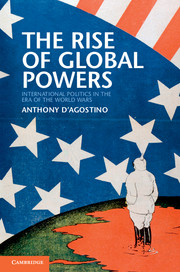Book contents
- Frontmatter
- Contents
- Maps
- Acknowledgements
- Introduction
- 1 The great powers at the dawn of world politics
- 2 Global origins of World War I: from the China scramble to the world crisis of 1904–1906
- 3 Global origins of World War I: a chain of revolutionary events across the world island
- 4 Balance and revolution, 1914–1918
- 5 A ragged peace, 1919
- 6 Scramble for Eurasia, 1919–1922
- 7 Drastic acts of unhappy powers, 1922–1923
- 8 Storms in the lull, 1924–1927
- 9 Politics and economics of the great slump, 1928–1933
- 10 A vogue for national economy
- 11 Mussolini’s moment, 1933–1935
- 12 The global civil war, 1936–1937
- 13 Last years of peace, 1937–1939
- 14 The European war, 1939–1941
- 15 The world war
- 16 Balance and hegemony
- Maps
- Notes
- Index
5 - A ragged peace, 1919
Published online by Cambridge University Press: 05 June 2012
- Frontmatter
- Contents
- Maps
- Acknowledgements
- Introduction
- 1 The great powers at the dawn of world politics
- 2 Global origins of World War I: from the China scramble to the world crisis of 1904–1906
- 3 Global origins of World War I: a chain of revolutionary events across the world island
- 4 Balance and revolution, 1914–1918
- 5 A ragged peace, 1919
- 6 Scramble for Eurasia, 1919–1922
- 7 Drastic acts of unhappy powers, 1922–1923
- 8 Storms in the lull, 1924–1927
- 9 Politics and economics of the great slump, 1928–1933
- 10 A vogue for national economy
- 11 Mussolini’s moment, 1933–1935
- 12 The global civil war, 1936–1937
- 13 Last years of peace, 1937–1939
- 14 The European war, 1939–1941
- 15 The world war
- 16 Balance and hegemony
- Maps
- Notes
- Index
Summary
The Armistice of 1918 and the ragged way that the war was ending put crippling limits on the peace that was made, or at least initiated, in 1919. On the other hand, the global military situation was so favorable to the naval victors that it seemed to suggest a lenient armistice and moderate peace treaties in Europe. Outside Western Europe, there seemed to be no limit on what might be gained, in Africa, the Middle East, and the rest of Eurasia. Alongside this redrawing of the world map, there occurred in Soviet Russia a call to world revolution. It was a curious juxtaposition: on the one hand, a systematic and, for the first time, doctrinal propaganda for anti-colonial revolt backed by one of the prewar great powers and, on the other, a gathering in by the victors of spoils of war all over the world. The whole process was overseen, moreover, by potentially the biggest naval power of them all, the United States, which spoke the language of New Diplomacy, neither revolutionary nor imperial, and which played the role, ineptly to be sure, of a balance to the other two forces.
Historical accounts of the peace originally put the European settlement center stage and saw everything else as a series of details. Not much was said about the Russian revolution and the civil war which continued while the peace conference sat. The stress was on the contradictions between the Wilsonian New Diplomacy and realities of the victor powers’ war aims. It was the Old Diplomacy versus the New. Both disappointed liberals and realists faulted Wilson for a variety of sins. During the Cold War, the Russian revolution came more clearly into view, perhaps blotting out the rest of the global picture. It was held that the world revolution against imperialism, which was assumed, dubiously, to have begun before the war, was the centerpiece of world politics and, with the Bolsheviks on board, now constituted an international party of change. It was resisted by a party of order, led by European imperialism and eventually abetted by the United States.
- Type
- Chapter
- Information
- The Rise of Global PowersInternational Politics in the Era of the World Wars, pp. 112 - 143Publisher: Cambridge University PressPrint publication year: 2011



